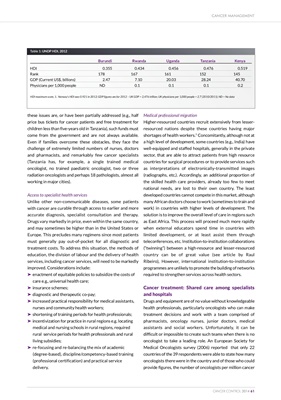
CANCER MANAGEMENT
62 CANCER CONTROL 2014
cases varied markedly up to 3,000 new cancer cases per year
per oncologist.
4 If cancer treatment is to be improved,
training more oncologists must be one of the highest
priorities.
Cancer may involve any part of the body. Optimal diagnosis
and treatment requires several specialists with different
skills and knowledge, including pathologists who make the
diagnosis,5 and often several cancer specialists, depending
upon the type of cancer. Surgical specialists cover a defined
anatomical region or "system" (e.g., gynaecologists,
orthopedic surgeons, neurosurgeons), but may specialize
further to deal exclusively with cancer in those regions.
Other specialists are expert in particular therapeutic
approaches, such as radiation oncologists (radiation therapy),
medical oncologists (systemic therapy), or clinical oncologists
(trained in both). Determination of the local extent of cancer
and the presence of distant metastases requires evaluation
by imaging specialists. In well resourced countries,
radiologists and nuclear medicine specialists are always
involved in the care of cancer patients. The lesser resourced
countries, however, may have to rely on clinical examination
only, or clinical examination supplemented by ultrasound
and/or simple X-rays to determine optimal therapy.
Computerized tomographic scanners, magnetic resonance
imaging and nuclear medicine scans are in short supply and in
East Africa, for example, available at only a handful of public
hospitals. For-profit private hospitals are more likely to have
such equipment.
Cancer surgery often involves radical procedures that
general surgeons are generally not trained to do. As systemic
therapy continues to improve, however, and is incorporated
into the treatment of cancers formerly treated by surgery (or
sometimes radiation therapy) alone, surgical procedures for
cancer are becoming less radical, and associated with less
morbidity.6,7 Adjuvant (post-surgical) and neoadjuvant (presurgical) systemic therapy
may permit less extensive surgery
since the tumour volume may be much smaller after
chemotherapy since resection margins can be small when
post-surgical systemic therapy is planned. In such cases,
surgery may often be performed by general surgeons,
although it is essential that combined modality therapy of this
kind is managed by an oncology team. Similar considerations
apply when radiation is associated with chemotherapy.
Haematological cancers are treated less and less with
radiation therapy, even when this was the primary modality in
past years8,9 and surgery is rarely indicated, so that cancer
care can be designed exclusively by haematologists, medical
oncologists or clinical haematologists. The very limited
number of radiation therapy units (in Tanzania there are six
machines for 40 million people; four are not yet functional),
and their high capital cost coupled to the need for highly
skilled radiation therapists, physicists and technicians
suggests that as new units are established, one area worthy of
research is the re-examination of the need or extent of
radiation in the modern era of systemic therapy. The
demonstration that radiation can be replaced by systemic
therapy in some diseases or stages of disease, would lead to a
reduction in the number of specialized radiation therapy units
and their associated specialists required. However, a project
of this kind would need considerable development of research
infrastructure and a more scientific approach to cancer care
than presently exists.
The critical importance of early diagnosis
It is generally true (there are exceptions) that patients with
small volume, localized disease can be more effectively
treated (i.e., are more likely to be cured, or at least have
longer survival) regardless of the modality(s) employed. Early
detection, then, should generally lead to better results within
the existing health care system at less cost and
inconvenience. Since early detection requires both a more
knowledgeable public and improved referral patterns for
diagnosis and treatment, an emphasis on education of the
public and medical community may be the single most
important action to be taken if better survival rates are to be
achieved. Moreover, primary cancer prevention also requires
public education, and economies of scale could be obtained
by combining primary and secondary prevention. Organized
approaches to needed education should, therefore, be built
into the cancer control plan, and referral guidelines and
networks developed. Greater efficiency in detection and
diagnosis should be feasible in all countries, but requires
planning and individuals dedicated to developing the
necessary educational tools.
Educating oncologists - the rapid expansion of
training opportunities
Although the training and professional efficiency of cancer
specialists may be assisted by visiting experts, this practice is
highly unlikely to meet the global need for oncologists and
other cancer professionals. Self-sufficient and sustainable
solutions are required.
A partial and time-honoured approach to the training of
specialists is "learning by doing", e.g., gaining experience in the
practice of oncology through working with a recognized
oncologist. The creation of one or more national
organizations comprised of health professionals - "colleges,"
"academies" or "boards" - involved in cancer care, but which